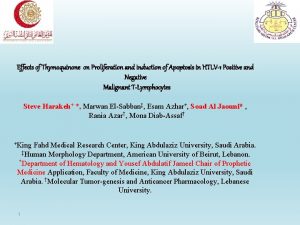Investigation of the effect of Thymoquinone TQ alone






















- Slides: 22

Investigation of the effect of Thymoquinone (TQ) alone or in combination with cisplatin on cell growth, cell cycle progression and apoptosis of human oral epithelial squamous cell carcinoma in vitro Abdulwahab Noorwali, Omer Aloafi, Safia alattas, Fathia Zahran, Ahmad Alabd Prof. Abdulwahab Noorwali clinical Biochem. Faculty of Medicine KAU

Introduction - Nigella sativa, commonly known as black cumin, is an annual flowering plant native to Mediterranean countries, Pakistan and India. - Its seed oil had been used in Arab traditional herbal medicine for the treatment of arthritis, lung diseases and hypercholesterolemia - Studies had shown that the biological activity of Nigella sativa seeds is mainly attributed to its essential oil component which is pre-dominantly (30– 48%) thymoquinone. -Since the extraction of thymoquinone by El-Dakhakhany, a number of studies have tested this compound for its therapeutic effect in many diseases including inflammation, cancer, sepsis, atherosclerosis and diabetes.

This compound was later found to inhibit the growth of many different kinds of carcinoma, including glioma/glioblastoma (U 87 MG and T 98 G, M 059 K and M 059 J) [Cecarini V, 2010, Gurung RL, 2010], breast adenocarcinoma (multi-drug-resistant MCF-7/TO, PO, MCF-7, MDA-MB-231 and BT-474) [52, 53]. leukemia (HL-60 and Jurkat) [52, 54, 55], lung cancer (NCI-H 460 and A 549)[56, 57] colorectal carcinoma (HT-29, HCT-116, DLD-1, Lovo and Caco-2) [57, 58], pancreatic cancer (MIA Pa. Ca-2, HPAC and Bx. PC-3)[40, 57], osteosarcoma (MG 63 and MNNG/HOS) [59], prostate cancer (LNCa. P, C 4 -2 B, DU 145 and PC-3) [60– 62].

Aim of The Study • To investigate the effects Thymoquinone (TQ) alone or in combination with cisplatin (CDDP) on cell growth, apoptosis of oral squamous cell carcinoma (UMSCC-14 C) cells in vitro. • To the best of our knowledge, this is one of the few studies to investigate the effect of TQ in oral cancer in vitro.

Materials and Methods • Two human cell lines were included: Oral Squamous Epithelial cell (OEC) & UMSCC-14 C. • Cells were maintained in monolayer culture. • Cells were treated with Thymoquinone with/without cisplatin. • Cell viability was assessed using WST-1 assay after incubating cells with the specified treatment at different concentrations & duration. • Dose response curves were plotted using serial concentration and percent viability. • The results are expressed as mean ± STD. • IC 50 s were Calculated using Sigma Plot Software Version 16. 0.

Materials and Methods • Using Flow cytometry, we assessed apoptosis. • Western blot analysis was used to assess the expression level of some key apoptotic proteins such as, p 53, caspase-9 and Bcl-2. • One and two way ANOVA was employed to detect significance between groups. • p<0. 05 was considered as statistically significant.

Materials and Methods • Combination index (CI) was calculated as described by (Chou & Talalay, 1984). Briefly, exponentially growing cells was exposed to equitoxic concentrations of TQ and cisplatin in 96 -well plates for 72 h and subsequently subjected to WST-1 assay. • CI was calculated from the formula: • The nature of drug interaction is defined as synergism if CI < 0. 8 as; antagonism if CI > 1. 2; and additive if CI ranges from 0. 8 -1. 2.

Results

Results

Results

Results

Effect Of TQ, , CDDP And Their Combination against UM-SCC-14 C Cell Line after 6 hours treatment

Effect Of TQ, , CDDP And Their Combination against UM-SCC-14 C Cell Line after 6 hours treatment 40 35 Early apoptosis Late apoptosis Necrosis Total cell death Cell population (%) 30 25 20 15 10 5 0 Control CDDP TQ 5. 0 µM TQ+CDDP 5. 0 µM

Effect Of TQ, , CDDP And Their Combination against UM-SCC-14 C Cell Line after 24 hours treatment

Effect Of TQ, , CDDP And Their Combination against UM-SCC-14 C Cell Line after 24 hours treatment 120 Early Apoptosis Cell population (%) 100 Late Apoptosis Necrosis Total cell death 80 60 40 20 0 Control CDDP TQ 0. 5 µM TQ 5. 0 µM TQ+CDDP 0. 5 µM TQ+CDDP 5. 0 µM

Effect Of TQ, , CDDP And Their Combination against OEC Cell Line after 24 hours treatment

Effect Of TQ, CDDP And Their Combination Apoptosis Assay In OEC Cell Line after 24 hours treatment 6 Early Apoptosis Late Apoptosis Necrosis Total cell death Cell population (%) 5 4 3 2 1 0 Control CDDP TQ 0. 5 µM TQ 5. 0 µM TQ+CDDP 0. 5 µM TQ+CDDP 5. 0 µM

Effect Of TQ, , CDDP And Their Combination On expression level of P 53 in UM-SCC-14 C Cell Line 5 Expression level (fold change) 4, 5 CTRL CDDP TQ TQ+CDDP 4 3, 5 3 2, 5 2 1, 5 1 0, 5 0 CTRL CDDP TQ CDDP+TQ

Effect Of TQ, CDDP And Their Combination On Bcl-2 Activity In UM-SCC-14 C Cell Line 1, 2 Bcl-2 content vs CTRL CDDP CTRL 1 TQ TQ+CDDP 0, 8 0, 6 0, 4 0, 2 0 CTRL CDDP Drug TQ CDDP+TQ

Effect Of TQ, CDDP And Their Combination On Caspase 9 Activity In UM-SCC-14 C Cell Line 7 6 CTRL CDDP TQ TQ+CDDP Caspase 9 content vs CTRL 5 4 3 2 1 0 CTRL CDDP Drug TQ CDDP+TQ

Conclusion and Recommendations • Our results demonstrate that TQ significantly reduced the cell viability of UM-SCC cell line, in a time and concentration dependent manner. • Also, The results demonstrate that Thymoquinone and/or Cisplatin have anti-proliferative property in UM-SCC cell lines. Combinations of the two drugs have synergistic effects and show potential in suppressing Oral Squamous cell carcinoma of oral cancer. • The findings may offer an alternative strategy for development of potential antineoplastic therapies against squamous cell carcinoma. • Further studies are required to understand the mechanism(s) of action by assessing cell cycle progression using Flow cytometry.

• THANK YOU
 Bohr effect in respiration
Bohr effect in respiration Bottleneck effect
Bottleneck effect Substitution effect and income effect
Substitution effect and income effect Cách giải mật thư tọa độ
Cách giải mật thư tọa độ Từ ngữ thể hiện lòng nhân hậu
Từ ngữ thể hiện lòng nhân hậu Trời xanh đây là của chúng ta thể thơ
Trời xanh đây là của chúng ta thể thơ Tư thế ngồi viết
Tư thế ngồi viết V cc
V cc Voi kéo gỗ như thế nào
Voi kéo gỗ như thế nào Thể thơ truyền thống
Thể thơ truyền thống Hươu thường đẻ mỗi lứa mấy con
Hươu thường đẻ mỗi lứa mấy con Diễn thế sinh thái là
Diễn thế sinh thái là Thế nào là hệ số cao nhất
Thế nào là hệ số cao nhất Vẽ hình chiếu vuông góc của vật thể sau
Vẽ hình chiếu vuông góc của vật thể sau Lp html
Lp html 101012 bằng
101012 bằng Thế nào là mạng điện lắp đặt kiểu nổi
Thế nào là mạng điện lắp đặt kiểu nổi Lời thề hippocrates
Lời thề hippocrates Vẽ hình chiếu đứng bằng cạnh của vật thể
Vẽ hình chiếu đứng bằng cạnh của vật thể Tư thế worm breton là gì
Tư thế worm breton là gì đại từ thay thế
đại từ thay thế Quá trình desamine hóa có thể tạo ra
Quá trình desamine hóa có thể tạo ra Sự nuôi và dạy con của hươu
Sự nuôi và dạy con của hươu











































